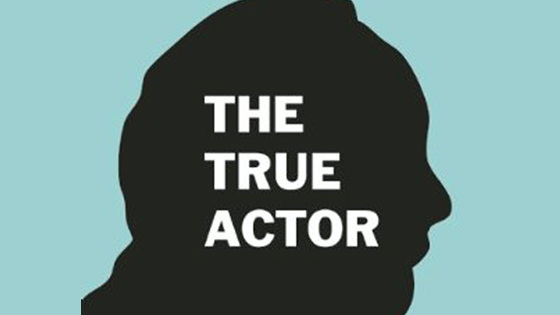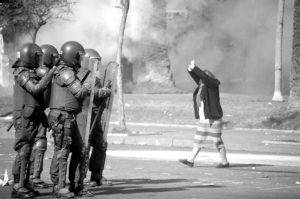|
To see long excerpts from “The True Actor” at Google Books, click here.
|
“The True Actor”
A book by Jacinto Lucas Pires
”Portugal is traveling through a black tunnel where the light at the end is merely a train about to crash into it,” writer and critic Pedro Mexia said at a talk titled “Portugal 2013” that I attended in July at the Disquiet International Literary Program. Serendipitously, it was at this same conference that I was introduced to Jacinto Lucas Pires’ award-winning novel “O verdadeiro ator,” which was being translated into English — “The True Actor.” I say serendipitously because for me, nothing elaborates on Mexia’s statement better than Lucas Pires’ book. It depicts the country hurtling through darkness as it struggles to reconstruct itself amid crippling austerity measures.
On the surface, “The True Actor” is a cinematic tale set in present-day Lisbon about down-and-out actor Américo Abril, who is struggling to play the different roles his life demands. As a thespian, he’s trying to write a play for which he has an assortment of ideas that never make it to paper. As a husband, he is stifled and emasculated by his wife Joana’s success in a high-powered job with the hilariously bureaucratic title of “Deputy Assistant to the Regional-General Sub-director of the National Department of Quality Control of Olive Oil and Oil Mills.” As a father, he cannot stand his toddler’s brutish actions. Abril is incapable of understanding his son as a child, much less as an extension of himself. The boy, unfortunately, is named Joachim, ostensibly after his mother. As a son, Abril feels misunderstood by his parents who are physically and emotionally removed from his reality.
His clumsy existence drags on until he has the chance to play his favorite part — the hopelessly delusional lover of Carla Bruna, the favorite prostitute of Portuguese politicians. But then Bruna is mercilessly and mysteriously murdered, leaving Abril as the prime suspect in an investigation that is both corrupt and absurd from its inception. At exactly the same time, he gets the acting break of his life: a part in a Hollywood film titled “Being Paul Giamatti.” Caught in a crime drama, he is forced to play yet another unwelcome, unsuitable part as his life unravels. A grotesque narcissist to the very bitter but “happy” end, he is absorbed with self-pity and idleness as the rest of Portugal tumbles into action.
Behind the tragicomic anti-hero’s journey, as hilariously absorbing as it is, lies the core of “The True Actor”: the heartbreaking story of an austerity-era Portugal reeling from an economic crisis that has baffled its historically melancholy population to the point of revolt.
In 2011, three years after the financial crisis began, Portugal received a €78 billion ($111 billion) bailout from the International Monetary Fund and European Union that inevitably came with strings attached: cut spending, raise taxes and find a way to survive despite it all. A series of disasters followed: a historic rise in unemployment to 19 percent, the closing of thousands of small businesses, and a joblessness rate of 43 percent among those under 25, leading to a brain drain as the educated youth of Portugal searched for work anywhere but home.
And then there was the outrage. The same year Portugal was, for lack of a better term, “bailed out,” the country began to stir with civil unrest. The Movimento 12 de Março — also called the Geração à Rasca (or precarious generation) protests — brought a week of demonstrations against austerity measures and the economic crisis. It was the largest Portuguese movement since the Carnation Revolution that culminated on April 25, 1974, when a military coup ousted the Estado Novo authoritarian regime established by António de Oliveira Salazar.
That brings us back to Américo Abril, a name that combines two very disparate elements: the United States’ individualist empire and Portugal’s April 25 revolution. Abril struggles throughout the novel to reconcile the two conflicting approaches to life. America’s attempt to be the perfect capitalist democratic utopia is in direct opposition to Portugal’s aspirations to build a functioning welfare state.
Abril’s narcissism, amplified by his grand first name, keeps him safely within the bubble of his bourgeois routines. Whether it is having lunch with his questionable, arrogant friends, soliciting Bruna for an afternoon tryst, or daydreaming of becoming a star, Abril has little time for self-reflection, let alone insight into the devastating situation his country faces. And yet, by accident, after one of his leisurely activities in Lisbon’s center, the anti-hero is swept into “a multitude united by the force of a NO.” Confused by the mass of people brought together by their discontent, Abril tries to point out the superficial beauty that he believes should pacify them as it does him — the “pretty” jacaranda flowers blossoming overhead –but the crowd is unmoved. The heartbreaking descriptions of relatable human desolation leading to acts of despair could be lifted straight out of Hugo’s “Les Miserables,” and any other number of classics:
“People who rob gas stations, ATM’s, jewelry stores in order to have something to eat, people who want a home or just some time to spend there, people black with angst or white with fright or brown with doubt; he has no idea from where they’ve all come, occupying the streets and the avenues with their familial battalions, with their diverse odors (odors in which the city and the country converge, a bizarre mix of generic soaps and roadside vegetation), people who rob drugstores to get medicine for their children and people who rob pharmacies to shoot themselves up with aspirin powder, people who’ve come from spacious continents to live in crowded slums, young and beautiful and perfectly lost people, with no future in sight, with nothing to wish for, people dressed in an incongruous mix of colors, people who, by the way they walk and the faces they wear, quickly reveal a diversity of culture and tradition, giving off the light of another time, and he leans against the tree trunk and watches them pass.”
Abril feels as though this is occurring “in another country,” and is alarmed to find himself in the midst of such palpable anguish. But one thing is clear: The people surrounding him have been united by their governments’ (both that of Portugal and of the European Union) indifference toward their very real, everyday suffering. And the desperation of being ignored has thrust them to action as the actor looks on in dismay.
The united multitudes stage a successful revolution and begin to build their country yet again from scratch. On the 29th of February, the crowds occupy parliament, and the indignant No! rooted in a painful past becomes the hopeful Yes! of the future. In the New Revolution, an Assembly of the Republic is quickly forged in which every citizen can have his or her voice heard, as everyone takes turns proposing solutions to any given problem faced by the country.
And though at first it seems this will lead to a more equitable, stable Portugal, it becomes clear by the end of the novel, as political and dramatic elements collide, that nothing has changed.
After being persecuted and detained for the Bruna murder case — also known as “The Bod Affair,” a name that implies utter indifference to the victim, who in life was nothing more than a body to her clients, and in death is merely a corpse being used in personal and political schemes — Abril is isolated in a white cell.
Before throwing him in solitary confinement, the two-dimensional cops explain that, due to the “upheaval,” their once impervious positions of power are suddenly at risk. This is why, they tell him, they have confiscated a black notebook Bruna’s sister gave Abril, containing the names of all her powerful clients — which is where the answer to her murder undeniably lies. But rather than taking the opportunity to enact justice, the inspectors have done as good bureaucrats do: “passed it along, through the proper channels, to our immediate superior who, has, no doubt, in turn, passed, or will soon pass, it up to the éminence grise. …”
It is not until Abril is released, in a scene worthy of the soap operas he’s starred in, that it becomes painfully apparent that bureaucracy and corruption are still ruling his country. In subsequent interviews regarding his “historic” release, Abril is asked how he feels to be the “Lordstar,” a name given him by the media. He tries to discuss “what’s really important” but the interviewer quickly distracts him and their audience with more salacious, entertaining questions. “Do you consider yourself a political prisoner? … Will you be suing the new regime? … Are the accommodations nice inside?”
Abril watches the footage of his interview as his wife falls asleep next to him. His life is restored to its unconscious futility, his superficial existence nearly intact despite the odyssey he underwent. And on the final page, as Abril gives in to Joana’s sexual advances, a haphazard comment reveals that it may have been his very own wife who was behind the bawdy murder, having killed Bruna herself in a moment of violent jealousy and then used her influential position to cover up the entire “Bod Affair.”
Whether or not this is true remains unclear to both the reader and Abril, but it doesn’t matter much to the latter. All that’s been lost is a body that allowed him to feel romance in an otherwise numb existence, the corpse of a poor, insignificant prostitute.
Instead of enacting change, Abril resorts to the governments’ favorite method: utter indifference. “Yes, let it be,” he thinks as he surrenders to his base desires, imagining this last sex scene playing out at the center of bleachers filled with cheering crowds. The narrator assures us, “It’s a happy ending.” But somehow, rather than happy, it feels more like a train with a blinding white light crashing into us.







You need to be a supporter to comment.
There are currently no responses to this article.
Be the first to respond.